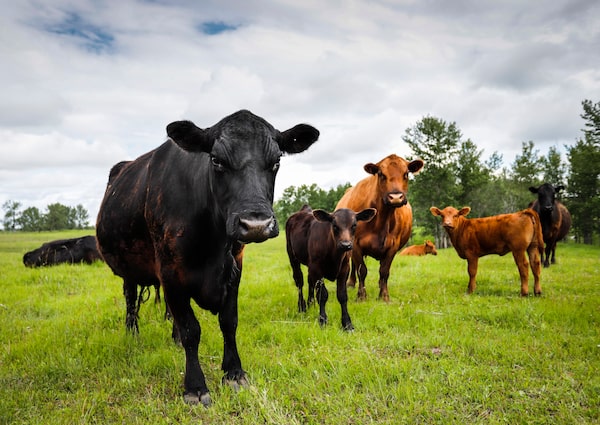
Cows and their calves graze in a pasture on a farm near Cremona, Alta., Wednesday, June 26, 2019.THE CANADIAN PRESS/Jeff McIntoshJeff McIntosh/The Canadian Press
A Canadian farmers group is pushing the federal government to invest more money in agriculture-related environmental projects to limit the effects of climate change, as Ottawa is set to release its next five-year plan on sustainable agriculture.
Driven by its core mission to promote climate-friendly agricultural policies that can reduce emissions, Farmers for Climate Solutions, or FCS, a national farmer-led coalition, has been calling on the government to boost funding for sustainable agriculture.
Ottawa has allocated $98.4-million in funding to adopt climate solutions in agriculture over the next 10 years. However, FCS has recommended a $2.1-billion investment plan to be included in the federal government’s next policy framework that would reduce greenhouse-gas emissions by 10 megatonnes.
Brent Preston, director of FCS and a farmer in Creemore, Ont., said the federal government has demonstrated a genuine enthusiasm for the recommended investment plan; however, it all depends on how the negotiations between the federal government and the provinces unfold.
“The recommendations are around the next agricultural policy framework, and that’s negotiated between the federal government and the provinces, and they have not come to an agreement yet,” Mr. Preston said.
The federal government’s policy framework will decide which agriculture projects get funding. It will be completed during the annual agriculture ministers’ summit in Saskatoon from July 20 to 22.
“I think the federal government is generally on board, but some provincial governments are very supportive while others are less. So, I think a lot of it depends on the provincial government,” Mr. Preston said.
The next five-year policy framework (2023-2028) will replace the Canadian Agricultural Partnership (CAP) which ends in ends March 31, 2023, said Cameron Newbigging, a spokesperson for Agriculture and Agri-Food Canada, in a written statement to The Globe and Mail.
Mr. Newbigging said the current framework is being discussed among governments and other concerned Canadian stakeholders.
“Federal, provincial and territorial governments are consulting with Canadians, including stakeholders such as producers, processors, Indigenous communities, women in agriculture, youth, environmental organizations, and small and emerging sectors,” he said.
In a statement last fall, the federal government outlined sustainable-agriculture approaches to help shape the next policy framework.
“We’re investing $1.5-billion to help farmers and processors reduce their environmental footprint and strengthen their resilience to climate change through sustainable practices and technologies, such as biomass energy, precision agriculture, and cover cropping,” Mr. Newbigging said.
Evan Fraser, director of the Arrell Food Institute at the University of Guelph, said that the recommendations made by Farmers for Climate Solutions would play a significant role in reducing Canada’s agricultural greenhouse-gas emissions if enacted by the federal government.
“The real contribution that they have made is to quantify where the greenhouse-gas emissions are coming out of the agricultural sector and to giving us some sense of abatement costs,” Mr. Fraser said.
In addition, the recommendations have stressed the importance of “better livestock management and how much lower the abatement costs are on livestock management versus soil management,” he said.
In 2018, greenhouse-gas emissions from the agriculture sector accounted for eight per cent of Canada’s total emissions, most of which come from livestock digestion and the use of inorganic nitrogen fertilizers.
Mr. Fraser said that Canada has become more aware of the need to adopt a sustainable agriculture approach by investing in resilient systems.
“We’re becoming aware of how important managing agriculture is in terms of our overall carbon emission reduction strategy or greenhouse-gas emission reduction strategy for our country,” he said.
“There are some significant ways we can reduce our country’s greenhouse-gas emissions by making key investments in agriculture.”
Editor’s note: The value of the recommended investment plan has been corrected in the online version of this story.
Interested in more stories about climate change? Sign up for the Globe Climate newsletter and read more from our series on climate change innovation and adaption.